外研版英语英语一般将来时复习含答案百度文库
一般将来时练习题及答案
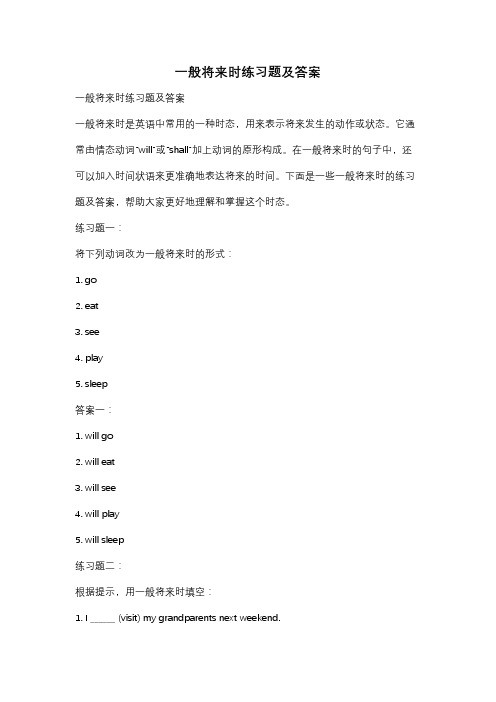
一般将来时练习题及答案一般将来时练习题及答案一般将来时是英语中常用的一种时态,用来表示将来发生的动作或状态。
它通常由情态动词“will”或“shall”加上动词的原形构成。
在一般将来时的句子中,还可以加入时间状语来更准确地表达将来的时间。
下面是一些一般将来时的练习题及答案,帮助大家更好地理解和掌握这个时态。
练习题一:将下列动词改为一般将来时的形式:1. go2. eat3. see4. play5. sleep答案一:1. will go2. will eat3. will see4. will play5. will sleep练习题二:根据提示,用一般将来时填空:1. I ______ (visit) my grandparents next weekend.2. They ______ (have) a party next month.3. She ______ (buy) a new car next year.4. We ______ (travel) to Europe next summer.5. He ______ (start) his new job next week.答案二:1. will visit2. will have3. will buy4. will travel5. will start练习题三:选择正确的一般将来时形式填空:1. I ______ (will / am going to) study for the exam tomorrow.2. They ______ (will / are going to) visit their friends in the evening.3. She ______ (will / is going to) cook dinner for her family tonight.4. We ______ (will / are going to) go shopping this weekend.5. He ______ (will / is going to) meet his friends at the park later. 答案三:1. will2. are going to3. is going to4. are going to5. is going to练习题四:根据句意,用一般将来时填空:1. The train ______ (arrive) at 10 o'clock tomorrow morning.2. We ______ (have) a picnic if the weather is nice.3. She ______ (not go) to the party because she has other plans.4. They ______ (not watch) the movie because they have already seen it.5. He ______ (not come) to the meeting because he is busy.答案四:1. will arrive2. will have3. will not go4. will not watch5. will not come练习题五:将下列句子改为否定句和疑问句形式:1. I will finish my homework.2. They will go to the beach.3. She will buy a new dress.4. We will have dinner at the restaurant.5. He will meet his friends at the cinema.答案五:1. I will not finish my homework. / Will I not finish my homework?2. They will not go to the beach. / Will they not go to the beach?3. She will not buy a new dress. / Will she not buy a new dress?4. We will not have dinner at the restaurant. / Will we not have dinner at the restaurant?5. He will not meet his friends at the cinema. / Will he not meet his friends at the cinema?通过以上的练习题及答案,希望大家对一般将来时有了更深入的了解。
外研版英语七年级下册语法Module 4---一般将来时will do

3. 我们不再坐公共汽车或自行车旅行了。(by)
_W__e__w_o_n__'t_t_r_a_v_e_l_b_y__b_u_s_e_s__o_r_b_i_k_e_s_.__________________________________________
• There is going to be
• There will be
• 明天下午将会有一次考试。
• There will be a test tomorrow afternoon.
There will be的不同句式
• 肯定句:There will be a test tomorrow afternoon. • 否定句:There will not be a test tomorrow afternoon. • 一般疑问句:Will there be a test tomorrow afternoon? • 肯定回答:Yes, there will be. • 否定回答:No, there won't be.
练习三、句子翻译 1. 将来每个家庭将会有一架小型飞机。
__E__v_e_r_y_f_a_m__i_ly__w__il_l_h_a_v__e_a__s_m__a_ll_p__la_n_e__i_n_t_h_e__f_u_tu__re_.________________________
2. 10年后城市中会有更多的树吗?
C. hope so
外研版英语英语一般将来时的用法大全附答案解析百度文库

外研版英语英语一般将来时的用法大全附答案解析百度文库一、初中英语一般将来时1.—Do you have any plans for tonight?—Yes ,I____at the new Italian restaurant in town.A. eatB. have eatenC. ateD. am going to eat【答案】 D【解析】【分析】句意:一今天晚上你有什么计划吗?一是的,我打算到镇上新开的意大利餐馆去吃饭。
A.一般现在时;B.现在完成时态;C. 一般过去时;D.一般将来时。
根据询问可知是计划,所以用将来时态,故选D。
2.—May I speak to Mr. Smith?—Sorry, he _______ Australia. But he _______ in two days.A. has been to; will come backB. has gone to; will be backC. has been in; would come backD. is leaving for; doesn't come back【答案】 B【解析】【分析】考查动词的时态。
句意:——我可以和史密斯先生通话吗?——对不起,他去澳大利亚了。
但是两天后回来。
have gone to“去某地了(还没回来)”;由时间状语in two days可确定第二个空用一般将来时,故答案为B项。
3.—I've never seen Mr. Taylor before.—Don't worry. I ______ him to you before the meeting.A. will introduceB. introducedC. have introducedD. had introduced【答案】 A【解析】【分析】句意:——我以前从没见过泰勒先生。
别担心。
开会前我会把他介绍给你。
外研版七年级英语下册单元语法专练-Module4-一般将来时will的用法(专练+答案)

Module 4 Life in the future.Grammar 一般将来时will的用法(时间:100分钟,满分:100分)一、单项选择(本大题共40小题,每小题1.5分,共60分)1.—What is Mary going to do?—She is going ________ a film.A.seeing B.see C.to see2.—What ________ you ________ to do?—I’m going to have P.E. lesson.A.are, going B.do, go C.is, going3.There ________ a meeting tomorrow afternoon.A.will be going to B.will going to be C.is going to be4.My family and I ________ to the Olympic Park tomorrow.A.go B.will go C.went5.—You will ________ better soon.—I hope so.A.feel B.feels C.feeling6.There ________ a class meeting tomorrow morning. The teacher will tell the students something important.A.will have B.is going to have C.is going to be 7.—Will they visit Shanghai next month?—________. They will go to Beijing.A.Yes, I will B.No, I won’t C.Yes, they will D.No, they won’t 8.“I won’t ________ to this place!” The girl said angrily(生气地).A.return B.return back C.returned D.returned back 9.— ________ he ________ to travel to Guangzhou next month?—Yes he is.A.Will; going B.Is; going C.Does; go D.Is; go10.I ________ back home next Sunday. How about you?A.was B.am C.am going to be D.go11.My bike is broken. I _________ a bus to school this afternoon.A.take B.took C.will take D.takes12.—I am very busy now. I ________ you an e-mail later.—OK.A.send B.sends C.sent D.will send 13.— ________ you ________ free tomorrow?— Yes, I am.A.Are; going to B.Are; will C.Are; will be D.Are; going to be14.Bill ________ in America tomorrow afternoon.A.arrive B.arrives C.arrived D.will arrive 15.Mary wants to buy the silk dress. She ________ it to my birthday party next week. A.wear B.wore C.will wear D.is wearing 16.—_______ Mr. Smith visit Beijing last week?—No, but he _______ Beijing with his son next time.A.Did; visits B.Did; will visitC.Does; visits D.Will; will visit17.— I don’t think Lucy will come today, ________ she?— ________, she won’t. She is ill and stays at homeA.won’t; No B.will; No C.won’t; Yes D.will; Yes 18.There ________ a sports meeting in our school next week.A.will have B.is going to have C.will be D.is19.—Is your sister going to buy some clothes?—__________.A.Yes, he is B.No, he isn’t C.Yes, she is D.No, she can’t 20.The scarf is only 10 dollars. I ________ it.A.buy B.take C.will buy D.will take 21.—There _______ a show in the school hall this afternoon, right?—Yeah. Let’s go and watch it together.A.will have B.will be C.is going to D.is going to have22.—There ________ a football match in the sports centre next week.—Great!A.is going to have B.will have C.is going to be D.are going to be23.What will your life _______ in the future.A.like B.be like C.likes D.looks like 24.There ________ a talk about how to learn English by Li Yang tomorrow evening. A.was B.will be C.had D.will have 25.—Please don’t forget to take part in the sports meeting next Monday.—________.A.I don’t B.I won’t C.I can’t D.I haven’t 26.He ________ very busy this week. He ________ free next week.A.will be; is B.is; is C.will be; will be D.is; will be 27.I don’t know if he ________ to the English corner, but I will ask him about that when he ________ to the class.A.goes; will come B.will go; will come C.goes; comes D.will go; comes 28.—Would you please turn down the TV a little? Jack is doing his homework.—Terribly sorry. I ________.A.will B.am going to C.won’t D.do29.Mr. Smith ________ a talk on country music next Monday.A.gives B.gave C.has given D.will give 30.If you don’t go tomorrow, ________.A.I don’t go either B.either will I C.neither do I go D.neither will I 31.Simon hopes Li Lei, his best friend ________ a football star in the world.A.are B.to be C.will be D.be32.We all hope you ________ hard every day.A.to study B.will study C.studies D.studying 33.I hope our team ________ the game tomorrow.A.to win B.winning C.will win D.win 34.—Do you think grandpa and grandma ________ late?—No, the train is usually on time.A.are B.were C.was D.will be 35.Listen to the weather report, and you’ll know what the weather ________ like next week.A.is B.was C.will be D.is being 36.— What is your plan for the May Day holiday?— I ________ a film with my friends.A.see B.sees C.am seeing D.will see 37.—Will students have lots of homework to do this weekend?—________. Teachers won’t give them any homework because of the school trip. A.Yes, they will B.Yes, they do C.No, they won’t D.No, they don’t 38.Many people think that robots are smart and they ________ able to talk like us in the future.A.are B.aren’t C.will be D.won’t be 39.—Will there be a space station in our country?—_________. We will build it in one year.A.Yes, they will B.Yes, there will C.No, they won’t D.No, there won’t 40.—Do you think people will lose jobs in the future because of robots, Tina?— ________. Robots can’t do all the things for us.A.Yes, they will B.Yes, they do C.No, they won’t D.No, they don’t 二、用所给单词的正确形式填空(本大题共10小题,每小题1分,共10分)41.If there is a fire, I ________ (call) 119 for help.42.Look at the clouds in the sky. I think it _________ (rain), isn’t it?43.The weather report says it _________ (rain) tomorrow.44.Who _________ (help) the old people clean their flats this weekend?45.His mother’s birthday is coming. He _________ (buy) her a present.46.Who _________ (give) us a talk about English study this afternoon?47.Do you think there ________ (be) a movie tomorrow evening?48.I ________ (not go) to school tomorrow.49.Jim ________ (not finish) his homework in five days.50.Kate ________ (check) her e-mails on Friday evening.三、完成句子(本大题共10小题,每小题2分,共20分)51.如果明天下雨,我们会待在家里。
新外研版五年级英语下册Module 10 Unit 2 一般过去时,一般现在时,一般将来时综合回顾-
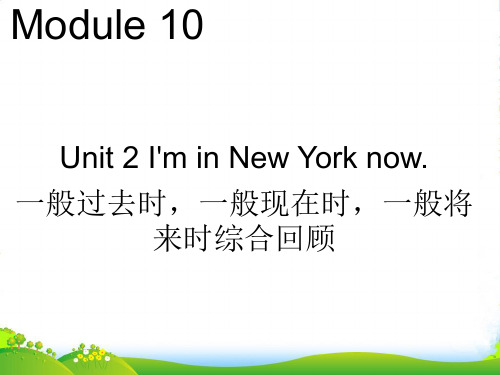
_D_i_d___ he _f_in_d__ __a_n_y__ meat in the fridge? 3、She stayed there for a week.(对划线部分提问)
一般过去时:Past Simple
表示过去发生的动作或存在的状态
行为动词的一般过去时: Ø陈述句:主语+动词过去式+其它
•She did homework yesterday .
Ø否定句:主语+助动词didn’t+动词原形+其它 •She didn’t do homework yesterday.
What do the elephants like eating?
4. He sends two emails every week.
How many emails does he send every week?
How often does he send two emails?
5.He has lunch at school.
Some day people will not go to the moon . 一般疑问句:把will 提到句子主语之前,结尾变问号。
Will Some day people go to the moon ?
特殊疑问句:特殊疑问词+will +主语+动词原形+其他?
Where will some people go ?
Module 10
Unit 2 I'm in New York now. 一般过去时,一般现在时,一般将
外研版英语英语一般将来时复习及解析
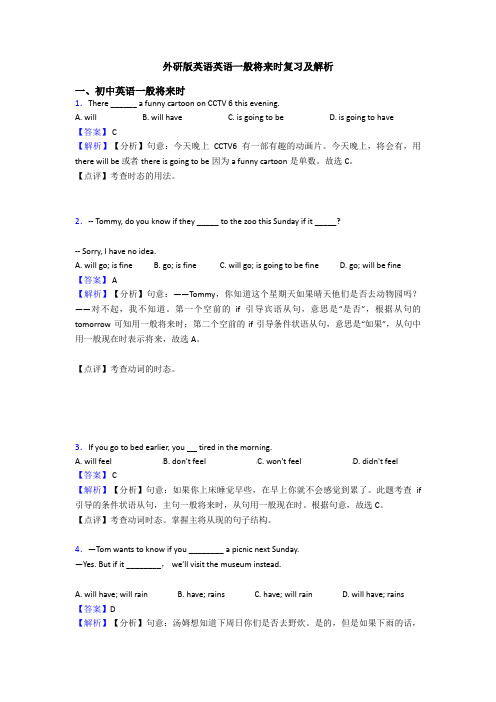
外研版英语英语一般将来时复习及解析一、初中英语一般将来时1.There ______ a funny cartoon on CCTV 6 this evening.A. willB. will haveC. is going to beD. is going to have【答案】 C【解析】【分析】句意:今天晚上CCTV6有一部有趣的动画片。
今天晚上,将会有,用there will be 或者there is going to be因为a funny cartoon是单数。
故选C。
【点评】考查时态的用法。
2.-- Tommy, do you know if they _____ to the zoo this Sunday if it _____?-- Sorry, I have no idea.A. will go; is fineB. go; is fineC. will go; is going to be fineD. go; will be fine【答案】 A【解析】【分析】句意:——Tommy,你知道这个星期天如果晴天他们是否去动物园吗?——对不起,我不知道。
第一个空前的if引导宾语从句,意思是“是否”,根据从句的tomorrow可知用一般将来时;第二个空前的if引导条件状语从句,意思是“如果”,从句中用一般现在时表示将来,故选A。
【点评】考查动词的时态。
3.If you go to bed earlier, you tired in the morning.A. will feelB. don't feelC. won't feelD. didn't feel【答案】 C【解析】【分析】句意:如果你上床睡觉早些,在早上你就不会感觉到累了。
此题考查if 引导的条件状语从句,主句一般将来时,从句用一般现在时。
根据句意,故选C。
【点评】考查动词时态。
掌握主将从现的句子结构。
一般将来时英语期末复习

一般将来时英语期末复习一、一般将来时1.If you go to bed earlier, you tired in the morning.A. will feelB. don't feelC. won't feelD. didn't feel【答案】 C【解析】【分析】句意:如果你上床睡觉早些,在早上你就不会感觉到累了。
此题考查if 引导的条件状语从句,主句一般将来时,从句用一般现在时。
根据句意,故选C。
【点评】考查动词时态。
掌握主将从现的句子结构。
2.—Have you watched the new movie Kung Fu Panda 3, Kelly?—Not yet. I _____ it with my classmate tonight.A. will watchB. was watchingC. have watched【答案】A【解析】【分析】句意:—凯莉,你看过新电影《功夫熊猫3》吗?—还没有呢。
今天晚上我要和我的同学一起去看。
A. will watch一般将来时态形式;B. was watching过去进行时态形式;C. have watched现在完成时态形式。
本句描述的是今天晚上将要发生的动作,句子用一般将来时态。
故选A。
【点评】本题考查时态辨析。
以及will watch;was watching;have watched三种时态的用法和区别3.I don't know if he _____ tomorrow. If he _____, I'll go to see him.A. leaves; gets upB. will go; will goC. will come; comesD. is arriving; leaves【答案】 C【解析】【分析】我不知道明天他是否会来。
如果他来了,我会去看他。
结合语境可知前文是宾语从句,根据时间状语可知从句中描述的是将来的动作,故用一般将来时态。
一般将来时练习题及答案
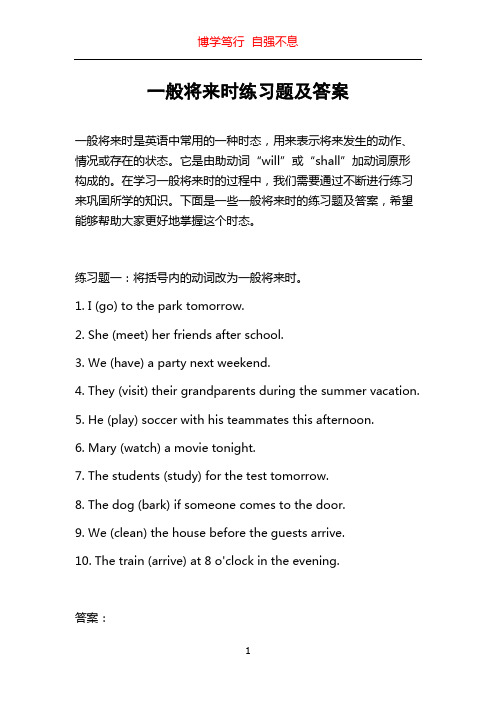
一般将来时练习题及答案一般将来时是英语中常用的一种时态,用来表示将来发生的动作、情况或存在的状态。
它是由助动词“will”或“shall”加动词原形构成的。
在学习一般将来时的过程中,我们需要通过不断进行练习来巩固所学的知识。
下面是一些一般将来时的练习题及答案,希望能够帮助大家更好地掌握这个时态。
练习题一:将括号内的动词改为一般将来时。
1. I (go) to the park tomorrow.2. She (meet) her friends after school.3. We (have) a party next weekend.4. They (visit) their grandparents during the summer vacation.5. He (play) soccer with his teammates this afternoon.6. Mary (watch) a movie tonight.7. The students (study) for the test tomorrow.8. The dog (bark) if someone comes to the door.9. We (clean) the house before the guests arrive.10. The train (arrive) at 8 o'clock in the evening.答案:1. will go2. will meet3. will have4. will visit5. will play6. will watch7. will study8. will bark9. will clean10. will arrive练习题二:根据提示完成下列对话,使用一般将来时。
A: Hi, Lisa! What (you/do) this weekend?B: I (visit) my grandparents. They live in the countryside. A: That sounds nice. How long (you/stay) there?B: I (stay) for two days. I'll come back on Sunday evening. A: Have a great time!答案:A: Hi, Lisa! What will you do this weekend?B: I will visit my grandparents. They live in the countryside. A: That sounds nice. How long will you stay there?B: I will stay for two days. I'll come back on Sunday evening. A: Have a great time!练习题三:选择正确的动词形式填空。
外研版八年级英语上册模块M1-一般现在时、现在进行时、一般将来时、一般过去时知识点总结—+练习
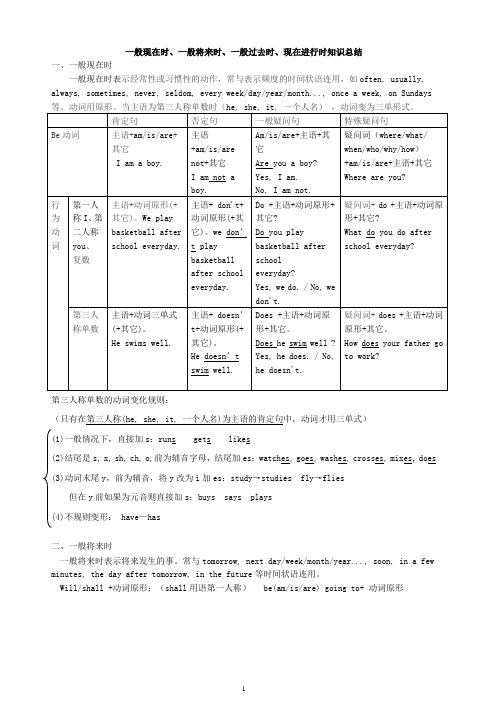
一般现在时、一般将来时、一般过去时、现在进行时知识总结一、一般现在时一般现在时表示经常性或习惯性的动作,常与表示频度的时间状语连用,如often, usually, always, sometimes, never, seldom, every week/day/year/month..., once a week, on Sundays第三人称单数的动词变化规则:(只有在第三人称(he, she, it, 一个人名)为主语的肯定句中,动词才用三单式)(1)一般情况下,直接加s:runs gets likes(2)结尾是s, x, sh, ch, o,前为辅音字母,结尾加es:watches, goes, washes, crosses, mixes, does(3)动词末尾y,前为辅音,将y改为i加es:study→studies fly→flies但在y前如果为元音则直接加s:buys says plays(4)不规则变形: have—has二、一般将来时一般将来时表示将来发生的事。
常与tomorrow, next day/week/month/year..., soon, in a few minutes, the day after tomorrow, in the future等时间状语连用。
Will/shall +动词原形;(shall用语第一人称) be(am/is/are) going to+ 动词原形三、一般过去时一般过去时表示过去某一时候或某一段时间所发生了的事情或存在的状态。
常与过去时间yesterday ,ago, this morning ,just now ,a moment ago ,last night / year / week/month ,once upon a time ,the other day,before ,the day before yesterday, in 1989, at the age of five, one day, then(那时), on that day, in the past 连用。
外研版英语小升初一般将来时专项训练含答案
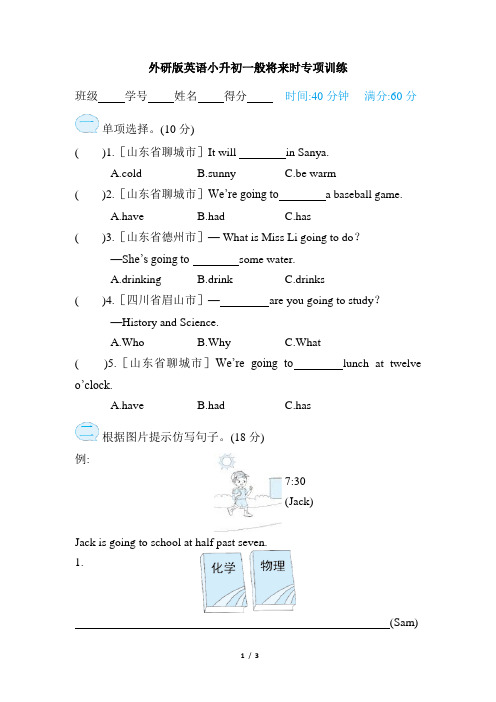
外研版英语小升初一般将来时专项训练班级学号姓名得分时间:40分钟满分:60分单项选择。
(10分)()1.[山东省聊城市]It will in Sanya.A.coldB.sunnyC.be warm()2.[山东省聊城市]We’re going to a baseball game.A.haveB.hadC.has()3.[山东省德州市]— What is Miss Li going to do?—S he’s going to some water.A.drinkingB.drinkC.drinks()4.[四川省眉山市]—are you going to study?—History and Science.A.WhoB.WhyC.What()5.[山东省聊城市]We’re going to lunch at twelve o’clock.A.haveB.hadC.has根据图片提示仿写句子。
(18分)例:7:30(Jack)Jack is going to school at half past seven.1.(Sam)2.(Daming) 3.(Lingling and Amy) 连词成句。
(20分)1.[四川省隆昌市]is, to, Chengdu, mother, tomorrow, my, going (.)2.[四川省隆昌市]will, sunny, Beijing, it, in, be (.)3.[四川省隆昌市]you, tomorrow, take, ball, will, your (?)4.[山东省德州市]to, say, going, goodbye, are, to, our,we, teachers (.)[河南省南阳市]按要求完成句子。
(12分)1.I’m going to get up at 6:30 tomorrow.(改为一般疑问句)you to get up at 6:30 tomorrow?2.She is going to listen to music after school. (对画线部分提问)she after school?一般将来时一、1.C 2.A 3.B 4.C 5.A二、1.Sam is going to study Physics and Chemistry.2.Daming is going to play basketball.3.Lingling and Amy are going to the theatre.三、1.My mother is going to Chengdu tomorrow.2.It will be sunny in Beijing.3.Will you take your ball tomorrow?4.We are going to say goodbye to our teachers.四、1.Are;going2.What is;going to do。
一般将来时练习题基础、提高、难题_汇总(含答案)
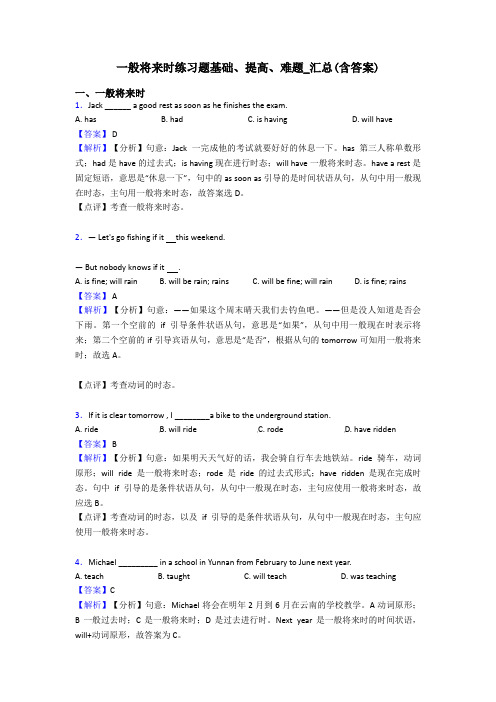
一般将来时练习题基础、提高、难题_汇总(含答案)一、一般将来时1.Jack ______ a good rest as soon as he finishes the exam.A. hasB. hadC. is havingD. will have【答案】 D【解析】【分析】句意:Jack一完成他的考试就要好好的休息一下。
has第三人称单数形式;had是have的过去式;is having现在进行时态;will have一般将来时态。
have a rest是固定短语,意思是“休息一下”,句中的as soon as引导的是时间状语从句,从句中用一般现在时态,主句用一般将来时态,故答案选D。
【点评】考查一般将来时态。
2.— Let's go fishing if it this weekend.— But nobody knows if it .A. is fine; will rainB. will be rain; rainsC. will be fine; will rainD. is fine; rains 【答案】 A【解析】【分析】句意:——如果这个周末晴天我们去钓鱼吧。
——但是没人知道是否会下雨。
第一个空前的if引导条件状语从句,意思是“如果”,从句中用一般现在时表示将来;第二个空前的if引导宾语从句,意思是“是否”,根据从句的tomorrow可知用一般将来时;故选A。
【点评】考查动词的时态。
3.If it is clear tomorrow , I ________a bike to the underground station.A. rideB. will rideC. rodeD. have ridden【答案】 B【解析】【分析】句意:如果明天天气好的话,我会骑自行车去地铁站。
ride骑车,动词原形;will ride是一般将来时态;rode是ride的过去式形式;have ridden是现在完成时态。
外研版英语一般将来时知识点总结
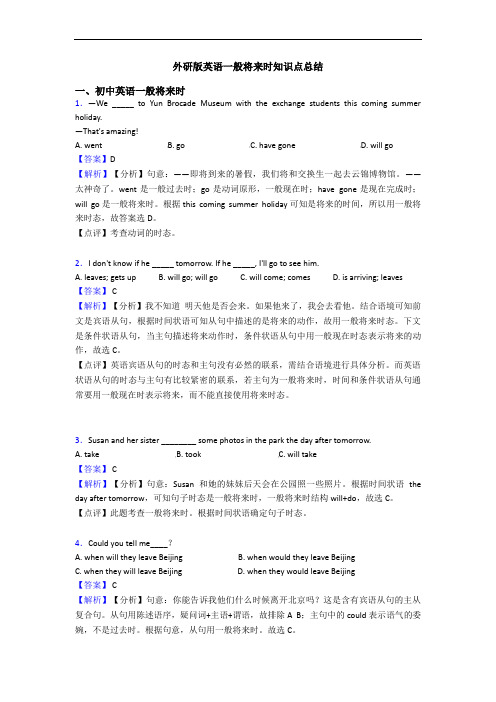
外研版英语一般将来时知识点总结一、初中英语一般将来时1.—We _____ to Yun Brocade Museum with the exchange students this coming summer holiday.—That's amazing!A. wentB. goC. have goneD. will go【答案】D【解析】【分析】句意:——即将到来的暑假,我们将和交换生一起去云锦博物馆。
——太神奇了。
went是一般过去时;go是动词原形,一般现在时;have gone是现在完成时;will go是一般将来时。
根据this coming summer holiday可知是将来的时间,所以用一般将来时态,故答案选D。
【点评】考查动词的时态。
2.I don't know if he _____ tomorrow. If he _____, I'll go to see him.A. leaves; gets upB. will go; will goC. will come; comesD. is arriving; leaves【答案】 C【解析】【分析】我不知道明天他是否会来。
如果他来了,我会去看他。
结合语境可知前文是宾语从句,根据时间状语可知从句中描述的是将来的动作,故用一般将来时态。
下文是条件状语从句,当主句描述将来动作时,条件状语从句中用一般现在时态表示将来的动作,故选C。
【点评】英语宾语从句的时态和主句没有必然的联系,需结合语境进行具体分析。
而英语状语从句的时态与主句有比较紧密的联系,若主句为一般将来时,时间和条件状语从句通常要用一般现在时表示将来,而不能直接使用将来时态。
3.Susan and her sister ________ some photos in the park the day after tomorrow.A. takeB. tookC. will take【答案】 C【解析】【分析】句意:Susan和她的妹妹后天会在公园照一些照片。
外研版英语【初中英语】 一般将来时练习题
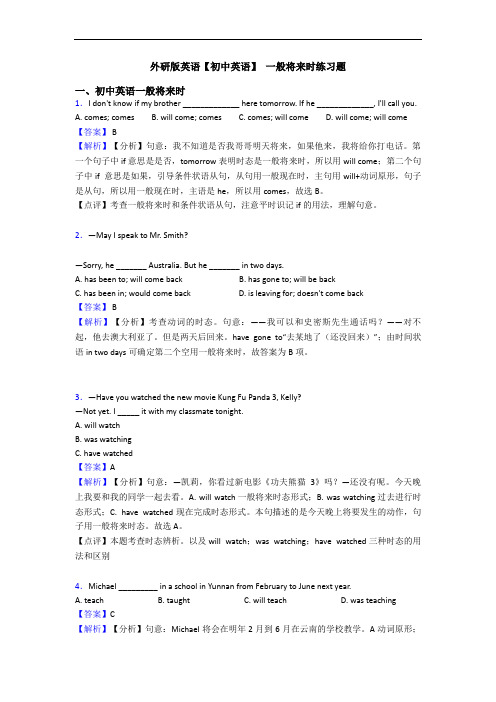
外研版英语【初中英语】一般将来时练习题一、初中英语一般将来时1.I don't know if my brother _____________ here tomorrow. If he _____________, I'll call you.A. comes; comesB. will come; comesC. comes; will comeD. will come; will come【答案】 B【解析】【分析】句意:我不知道是否我哥哥明天将来,如果他来,我将给你打电话。
第一个句子中if意思是是否,tomorrow表明时态是一般将来时,所以用will come;第二个句子中if 意思是如果,引导条件状语从句,从句用一般现在时,主句用will+动词原形,句子是从句,所以用一般现在时,主语是he,所以用comes,故选B。
【点评】考查一般将来时和条件状语从句,注意平时识记if的用法,理解句意。
2.—May I speak to Mr. Smith?—Sorry, he _______ Australia. But he _______ in two days.A. has been to; will come backB. has gone to; will be backC. has been in; would come backD. is leaving for; doesn't come back【答案】 B【解析】【分析】考查动词的时态。
句意:——我可以和史密斯先生通话吗?——对不起,他去澳大利亚了。
但是两天后回来。
have gone to“去某地了(还没回来)”;由时间状语in two days可确定第二个空用一般将来时,故答案为B项。
3.—Have you watched the new movie Kung Fu Panda 3, Kelly?—Not yet. I _____ it with my classmate tonight.A. will watchB. was watchingC. have watched【答案】A【解析】【分析】句意:—凯莉,你看过新电影《功夫熊猫3》吗?—还没有呢。
外研版英语七下试题 module4unit1知识点:一般将来时
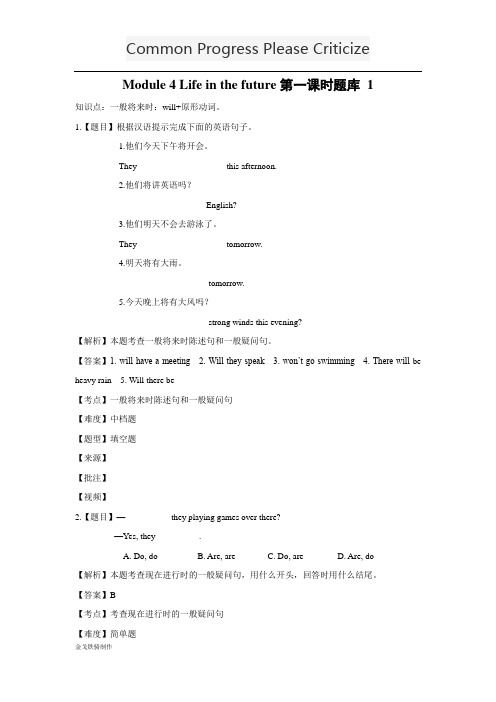
Module 4 Life in the future第一课时题库1知识点:一般将来时:will+原形动词。
1.【题目】根据汉语提示完成下面的英语句子。
1.他们今天下午将开会。
They____________________ this afternoon.2.他们将讲英语吗?____________________English?3.他们明天不会去游泳了。
They____________________ tomorrow.4.明天将有大雨。
____________________ tomorrow.5.今天晚上将有大风吗?____________________ strong winds this evening?【解析】本题考查一般将来时陈述句和一般疑问句。
【答案】1. will have a meeting 2. Will they speak 3. won’t go swimming 4. There will be heavy rain 5. Will there be【考点】一般将来时陈述句和一般疑问句【难度】中档题【题型】填空题【来源】【批注】【视频】2.【题目】—__________ they playing games over there?—Yes, they__________.A. Do, doB. Are, areC. Do, areD. Are, do【解析】本题考查现在进行时的一般疑问句,用什么开头,回答时用什么结尾。
【答案】B【考点】考查现在进行时的一般疑问句【难度】简单题【题型】选择题【来源】【批注】【视频】3.【题目】Three __________ a football match tomorrow.A. will haveB. will beC. will hasD. going to be 【解析】本题考查there be句型一般将来时的用法。
【答案】B【考点】考查there be句型一般将来时的用法【难度】简单题【题型】选择题【来源】【批注】【视频】4.【题目】__________ she/she is kind, __________ we all like her.A. Because, soB. So, becauseC. /, becauseD. /, so 【解析】英语中because和so不能在一句话中同时出现。
一般将来时练习题(含答案)

一般将来时练习题一、单项选择( ) 1. There __________ a meeting tomorrow afternoon.A. will be going toB. will going to beC. is going to beD. will go to be ( ) 2. Charlie ________ here next month.A. isn’t workingB. doesn’t workingC. isn’t going to workingD. won’t work ( ) 3. He ________ very busy this week, but he ________ free next week.A. will be; isB. is; isC. will be; will beD. is; will be( ) 4. There ________ a dolphin show in the zoo tomorrow evening.A. wasB. is going to haveC. will haveD. is going to be( ) 5. –_____ you ______ free tomorrow?– No. I _____ free the day after tomorrow.A. Are; going to; willB. Are; going to be; willC. Are; going to; will beD. Are; going to be; will be( ) 6. Mother ________ me a nice present on my next birthday.A. will givesB. will giveC. givesD. give( ) 7. – Shall I buy a cup of tea for you?–________. (不,不要。
一般将来时知识点总结及经典习题(含答案)

14.-- Tommy, do you know if they _____ to the zoo this Sunday if it _____?
-- Sorry, I have no idea.
【点评】考查动词的时态。
15.—Have you finished the poster for the party?
—Not yet. Iit in two days.
A. finish B. finished C. will finish D. have finished
【答案】C
【解析】【分析】此题的关键点在“in two days”和一般将来时连用,故选C。句意是:—你已经完成聚会的海报了吗?—还没有,我会在两个以后完成的。
A. will come; will come B. will come; comes C. comes; will come
【答案】A
【解析】【分析】句意:——你知道怀特太太今晚是否来吃晚饭吗?——不知道。但我认为如果她有空,她会来。空一,句子为含有宾语从句的主从复合句,主句是一般现在时,从句用它所需要的任何时态,根据this evening今晚,可知句子为一般将来时,will come;空二,回答是when引导的时间状语从句,从句是一般现在时,主句应用将来时,will come,故选A。
12.Many scientists believe that robotsable to talk like humans in 50 years.
A. were B. are C. will be D. have been
- 1、下载文档前请自行甄别文档内容的完整性,平台不提供额外的编辑、内容补充、找答案等附加服务。
- 2、"仅部分预览"的文档,不可在线预览部分如存在完整性等问题,可反馈申请退款(可完整预览的文档不适用该条件!)。
- 3、如文档侵犯您的权益,请联系客服反馈,我们会尽快为您处理(人工客服工作时间:9:00-18:30)。
外研版英语英语一般将来时复习含答案百度文库一、初中英语一般将来时1.—You'd better take an umbrella. The weather report says it in the afternoon.— Thank you. I will put one in my bag.A. will rainB. rainsC. is raining【答案】 A【解析】【分析】句意:——你最好带把伞。
天气预报说是下午要下雨。
——谢谢你。
我会在包里放一个。
A一般将来时,B一般现在时,C现在进行时,根据 in the afternoon和 I will put one in my bag 可知时态是一般将来时,故选A。
【点评】考查时态,注意一般将来时的用法。
2.—May I speak to Mr. Smith?—Sorry, he _______ Australia. But he _______ in two days.A. has been to; will come backB. has gone to; will be backC. has been in; would come backD. is leaving for; doesn't come back【答案】 B【解析】【分析】考查动词的时态。
句意:——我可以和史密斯先生通话吗?——对不起,他去澳大利亚了。
但是两天后回来。
have gone to“去某地了(还没回来)”;由时间状语in two days可确定第二个空用一般将来时,故答案为B项。
3.If you go to bed earlier, you tired in the morning.A. will feelB. don't feelC. won't feelD. didn't feel【答案】 C【解析】【分析】句意:如果你上床睡觉早些,在早上你就不会感觉到累了。
此题考查if 引导的条件状语从句,主句一般将来时,从句用一般现在时。
根据句意,故选C。
【点评】考查动词时态。
掌握主将从现的句子结构。
4.—Tom wants to know if you ________ a picnic next Sunday.—Yes. But if it ________, we'll visit the museum instead.A. will have; will rainB. have; rainsC. have; will rainD. will have; rains【答案】D【解析】【分析】句意:汤姆想知道下周日你们是否去野炊。
是的,但是如果下雨的话,我们将改去参观博物馆。
if引导宾语从句时,意为“是否”,句子时态根据句意选用,if 作为“假如”时,引导的是条件状语从句,主句用一般将来时,从句用一般现在时表示将来,故选D【点评】此考点也是中考最喜欢出现的考点,if除了可以引导条件状语从句外,还可以引导宾语从句,翻译成“是否”。
引导宾语从句时没有“主将从现”的说法。
除了if外,还有when, as soon as也一样要注意“主将从现”。
5.—Do you know ______?—The day after tomorrow.A. when we visited the museumB. when we will visit the museumC. when did we visit the museumD. when will we visit the museum【答案】 B【解析】【分析】句意:——你知道我们什么时候参过博物馆吗?——后天。
Do you know 后接宾语从句,应使用陈述结构,因此排除C和D,根据答语The day after tomorrow.可知问句使用一般将来时,故答案是B。
【点评】考查宾语从句的语序各时态,注意宾语从句使用陈述语序,根据答语确定问句的时态。
6.—Could you tell me_______?—In five minutes, at 10: 25.A. when did the next underground arriveB. when the next underground arrivedC. when will the next underground arriveD. when the next underground will arrive【答案】D【解析】【分析】句意:—你能告诉我下一个地铁什么时候到吗?—五分钟后,10点25分。
tell后跟宾语从句,宾语从句需用陈述句语序,A、C两项都是疑问句语序,可排除。
根据答语In five minutes,结合句意语境,可知还没有到站,需用一般将来时态,故答案选D。
【点评】考查宾语从句。
根据语境确定宾语从句的时态,注意陈述语序。
7.—I've never seen Mr. Taylor before.—Don't worry. I ______ him to you before the meeting.A. will introduceB. introducedC. have introducedD. had introduced【答案】 A【解析】【分析】句意:——我以前从没见过泰勒先生。
别担心。
开会前我会把他介绍给你。
根据上句 I've never seen Mr. Taylor before. 到现在为止没有见过他,所以才有开会前介绍给你。
要用一般将来时,will+动词原形。
故选A。
【点评】考查一般将来时的构成和用法。
注意根据语境确定动词的时态。
8.Next week, each student in the class ____ a small gift from their teachers.A. receivesB. receivedC. will receiveD. has received【答案】 C【解析】【分析】句意:下周,班上的每个学生都将收到老师的小礼物。
由next week,可知此句要用一般将来时,其基本结构will+动词,故选C。
【点评】考查动词一般将来时的用法,注意根据句中的时间状语确定正确时态。
9.—How many children do most post-80s families have?—One. They ______ two in the future, I guess.A. will haveB. hadC. haveD. have had【答案】A【解析】【分析】句意:——大部分80后的家庭有几个孩子?——一个。
我猜想将来他们会有两个的。
A.will have将会有;B为have的原形;C为have的过去完成时。
根据回答中“in the future”在将来,可知应选将来时。
一般将来时的两种结构:will+动词原形或be going to do,故选A。
【点评】考查时态一般将来时,注意一般将来时的状语提示,如tomorrow,next year ,in the future等。
10.Hold your dream,_____ you might regret some day.A. andB. orC. butD. so【答案】 B【解析】【分析】考查连词.句意:坚持你的梦想,___有一天你会后悔的。
A和,表示并列关系,B否则、或者,C但是,表示转折关系,D所以,表示因果关系。
结合语境可知,用or否则,选B.11.— Have you watched the new movie Jurassic World, Steven?— Not yet. I ________ it with my cousin this evening.A. will watchB. was watchingC. watchedD. have watched【答案】 A【解析】【分析】句意:你看过《侏罗纪世界》这部新电影吗,史蒂文? ——没有。
今晚我要和我的表弟一起看。
其中watch movie意思是看电影,因为this evening 时间是今晚,动作将要进行,所以用将来时。
故选A。
【点评】考查时态。
12.Could you tell me____?A. when will they leave BeijingB. when would they leave BeijingC. when they will leave BeijingD. when they would leave Beijing【答案】 C【解析】【分析】句意:你能告诉我他们什么时候离开北京吗?这是含有宾语从句的主从复合句。
从句用陈述语序,疑问词+主语+谓语,故排除A B;主句中的could表示语气的委婉,不是过去时。
根据句意,从句用一般将来时。
故选C。
【点评】此题考查宾语从句。
注意从的语序和时态。
13.Mr. Green, a famous writer, ______our school next week.A. visitedB. visitsC. was visitingD. will visit【答案】 D【解析】【分析】句意:格林先生,一位著名的作家,下周要来我们学校参观。
A是一般过去时;B是一般现在时;C是过去进行时;D是一般将来时。
根据next week可知此处用一般将来时,故答案为D。
【点评】考查动词的时态,注意找语境中的时间状语。
14.In the near future, there ________ self-driving cars in our city.A. isB. wasC. areD. will be【答案】 D【解析】【分析】句意:在不久的将来,我们城市将会有自动驾驶汽车。
根据In the near future,可知时态是一般将来时,there be结构的一般将来时为:there will be,故选D。
【点评】考查时态,注意there be结构的一般将来时为:there will be的用法。
15.Susan and her sister ________ some photos in the park the day after tomorrow.A. takeB. tookC. will take【答案】 C【解析】【分析】句意:Susan和她的妹妹后天会在公园照一些照片。
根据时间状语the day after tomorrow,可知句子时态是一般将来时,一般将来时结构will+do,故选C。
